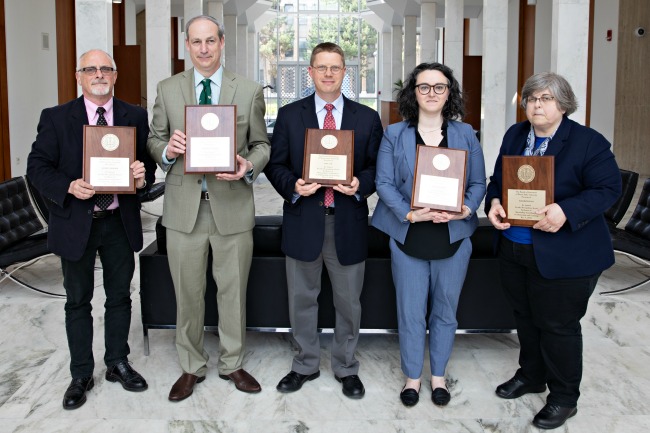
Five Wayne State University professors who have distinguished themselves with significant scholarly achievements were recently honored with the 2018 WSU Board of Governors Faculty Recognition Awards.
The awards are offered annually to full-time faculty members who make outstanding contributions to scholarship and learning. Each recipient receives a citation from the board, an engraved wall plaque and a monetary award.
This year's recipients are:
Robert Aguirre, professor in the Department of English and senior associate dean, College of Liberal Arts and Sciences, was honored for the publication of Mobility and Modernity: Panama in the Anglo-American Imagination (Ohio State University Press, 2017). Tracing U.S. and British representations of Panama in the pre-Canal decades of the 19th century, Aguirre shows how centrally Panama figured in the development of modern ideas about global transport, mobility and speed. True to its subject’s global reach, the book puts British, U.S. and Panamanian writers like Anthony Trollope, John Lloyd Stephens, Eadweard Muybridge and Tómas Martín Feuillet in a newly transnational context, reshaping scholarly understandings of the Panama Canal and the ideas of the interconnected world that it helped create.
Eric Ash, professor in the Department of History and director of graduate studies, College of Liberal Arts and Sciences, was recognized for the publication of The Draining of the Fens: Projectors, Popular Politics, and State Building in Early Modern England (John Hopkins University Press: 2017). Ash’s book explores the draining of the Fens in eastern England as one of the largest engineering projects during 17th century Europe. A series of Dutch and English projectors, working over several decades and with the full support of the Crown, transformed hundreds of thousands of acres of seemingly barren wetlands into dry, arable farmland. As projectors reconstructed entire river systems, these new, artificial channels profoundly altered both the landscape and the lives of those who lived on it.
Elizabeth Faue, professor and chair in the Department of History, College of Liberal Arts and Sciences, was honored for the publication of Rethinking the American Labor Movement (Routledge: 2017). The book is a reappraisal of 20th century labor history. Fractured into competing groupings by race, gender, religion, region and political allegiance, the working class has rarely operated as a monolithic whole. Faue undermines the common narrative of a singular, white and male working class by using intersectional analysis to place the experiences of women and people of color at the center of her story. She draws on the insights of feminist scholarship and critical race studies while maintaining a social historian’s interest in power dynamics and the lived experience of her subjects.
Jennifer Hart, associate professor in the Department of History, College of Liberal Arts and Sciences, was recognized for the publication of Ghana on the Go: African Mobility in the Age of Motor Transportation (Indiana University Press: 2016). This work is a history of motor transportation in 20th-century Ghana and the first book to examine automobility in Africa. Hart argues that the introduction of motor transportation shaped social, cultural and economic practices and modes of political engagement that continue to reverberate in Ghana today. She weaves together archival and ethnographic research to reconstruct the culture and practice of automobility and to show how entrepreneurial drivers and their passengers adapted technology for their own purposes.
Jeffrey Howard, professor in the Department of Geology, College of Liberal Arts and Sciences, was honored for the publication of Anthropogenic Soils (Springer: March 2017). Howard’s recent book publication Anthropogenic Soils is part of a series Progress in Soil Science by Springer. The scope of this series is to publish books that enhance the understanding of the functioning and diversity of soils in all parts of the globe. Howard’s book filled an important scientific need by collating data from such diverse fields as soil science, archaeology, geology, engineering and environmental science, and organizing them into a state-of-the-art compendium of scientific knowledge on the topic of “artificial soils.” This work includes extensive and ongoing studies of soil health and resilience, urban soil revitalization, surface mine mining and other types of land reclamation, contaminated site assessment and remediation.
